Easy composting
Easy composting enriches the soil and saves one from having to barrow the humus around the patch.
Every organic gardener knows the magic that a compost heap performs. But still it is a tiresome job and heavy work. Here are a few tips from decades of experience.
Compost heaps mostly seem to be tucked away in some corner, out of sight because they are untidy things. That means carting all your prunings, grass cuttings and kitchen waste some extra way; and when the humus is formed, barrowing it back to distant parts of the garden.
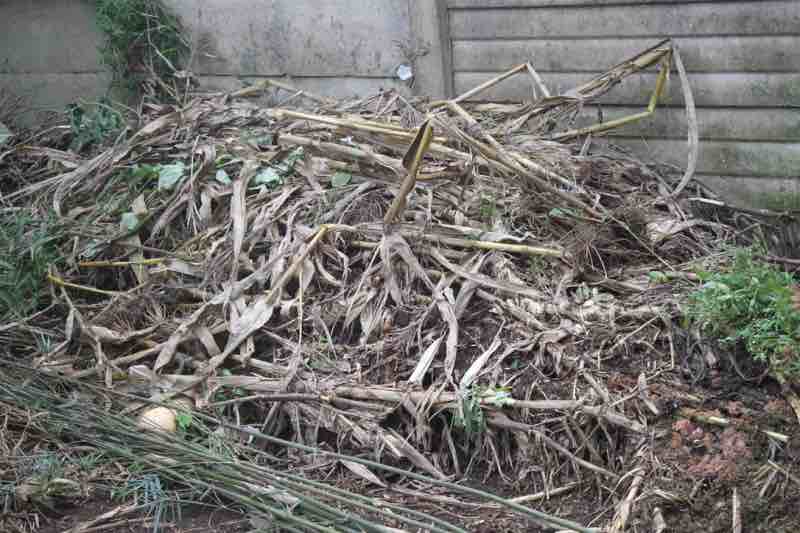
Almost exactly one year later this is what that pile of old mealie stalks have produced; the butternut plants are growing in profusion.
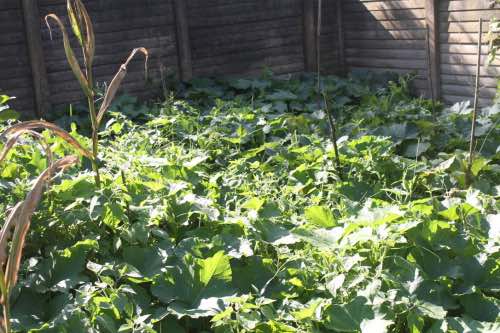 A profusion of butternut vines
A profusion of butternut vinesAnd this is what we found in yet another few months; this easy composting produces more food than any one family can ever eat.
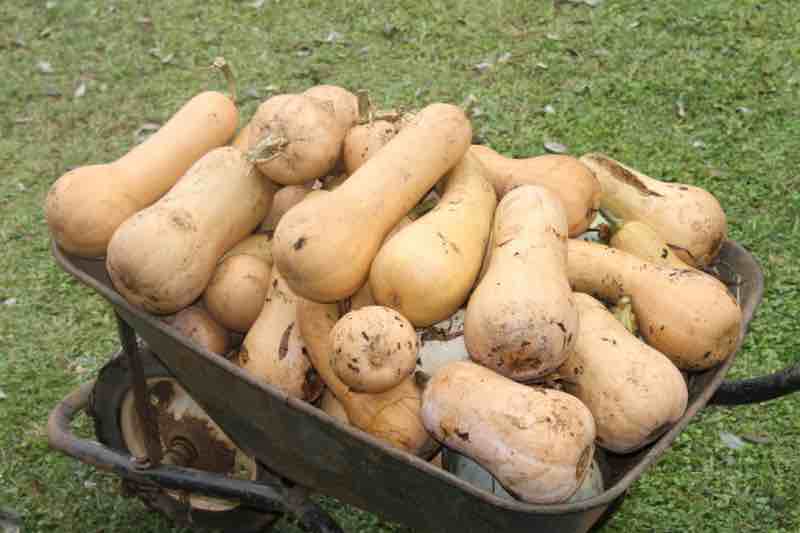 Barrows full of sweet butternuts
Barrows full of sweet butternutsBuild a central compost pile
If you build a central compost pile then it saves you a lot of hard work both coming and going. It may mean sacrificing a little pride about your immaculate home.
Choose a central garden bed that is not performing as well as it might. Or one where there is a lot of waste such as corn stalks; they are heavy and carting them to a distant compost pile is a fag. Incidentally they are much easier to dig out of the ground after a rain.
Corn stalks make a great foundation for any compost heap; then pile on grass cuttings, coffee-grounds and old leaves. Traditionally one should have twice as much dry material to green but it's not critical; nature will still do its thing, perhaps a little more slowly turning garden and kitchen refuse into humus.
Above you can see how we used to build compost heaps up against a wall; now they will often be located in a central bed.
In a couple months turn the pile, harvesting the "black gold" that is your humus and move any residual stalks to an adjacent patch; start a new heap. Needy garden beds will now be located much closer, easing the burden of barrowing that compost.
You'll now find that anything you plant where that compost heap was located will take off; much of the humus is left behind deep in the soil.
Or simply plant your butternut seeds in the compost-heap in the spring.
"Researchers modelled the combined effects of export restrictions, increased energy costs and mid-2022 fertiliser prices which were three times higher than at the start of the previous year. Food costs could rise by 81 per cent in 2023 compared to 2021 levels."
- School of GeoSciences, University of Edinburgh.
Water for composting
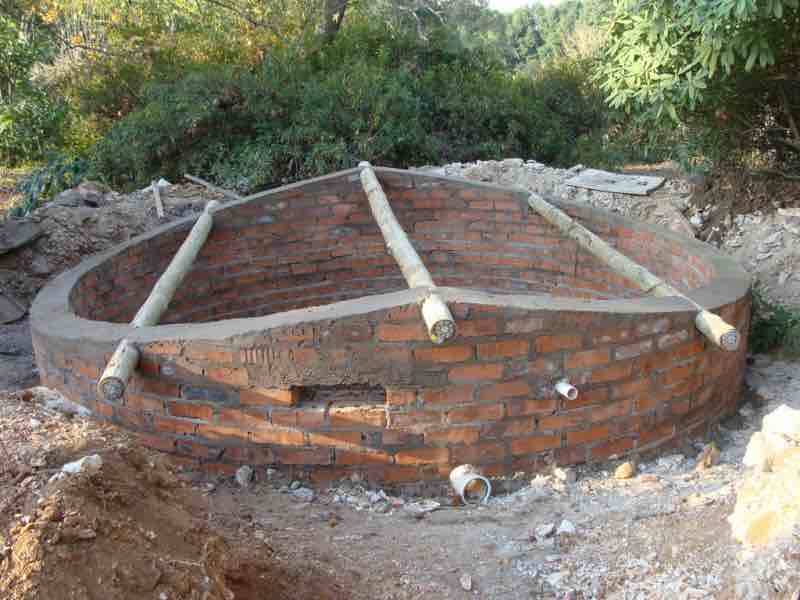
Water is expensive and precious. During prolonged dry weather easy composting means dampening your central heap. Think about harvesting the rain; it's a lot cleaner[1] and courtesy of the heavens it comes for free if you can store it. You can even pump it into the home.
However your compost heap certainly does not like being water-logged.
This underground reservoir to harvest and store the rain has certainly helped with easy composting.
Should you keep ducks a few buckets of water from the pond will add extra nutrients and bacteria for the myriads of bugs that reduce garden waste to precious humus.
Chicken litter
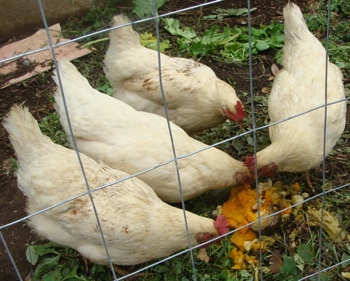
Buying in chicken litter or better still from your own birds, adds nitrogen and will greatly hasten easy composting. We routinely throw all of our weeds first to the hens before adding them to the pile; they peck and scratch at them, devouring any seeds and reducing the volume. The whole process is speeded up.
Cow, goat or horse manure would be equally good.
No inorganic fertiliser can replace all the minerals and compounds like the humic acid that aids plant growth; there are literally hundreds of these substances, perhaps thousands.
After a crop like corn it is good to follow with legumes such as peas or beans; bacteria attach to the roots providing nitrogen for the production of amino-acids, leaving much in the soil for the next generation of lettuce and spinach.
Lightning also provides smaller amounts of nitrogen for the soil[2].
Crop rotation is an essential part of organic gardening; it also limits the spread of pests and plant diseases.
Raised garden beds
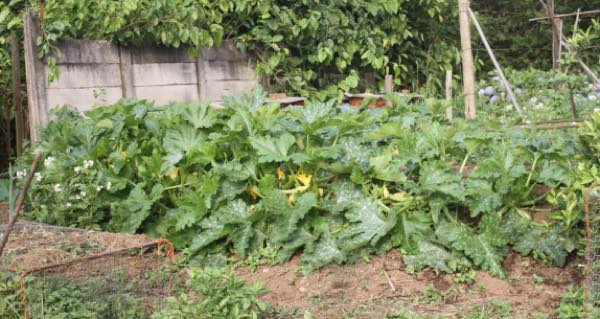 An old compost heap turned into a raised garden bed
An old compost heap turned into a raised garden bedAn old German concept is to turn every compost heap into a permanent raised garden bed; it's hard work but does not need to be opened again for many years. Plants grow prolifically. The soil is warmer from the decaying matter and the underlying logs retain water.
Abundant food prevents hunger
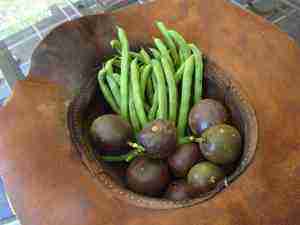
Let's talk about hunger. I am not exaggerating; we have fresh fruit from our backyard every single day and grow food to the value of at least R100,000 each year in our suburban garden. The pile of beans below came from just two plants; at the end of the season after enjoying them fresh and green for months.
A small garden can provide a mountain of food.
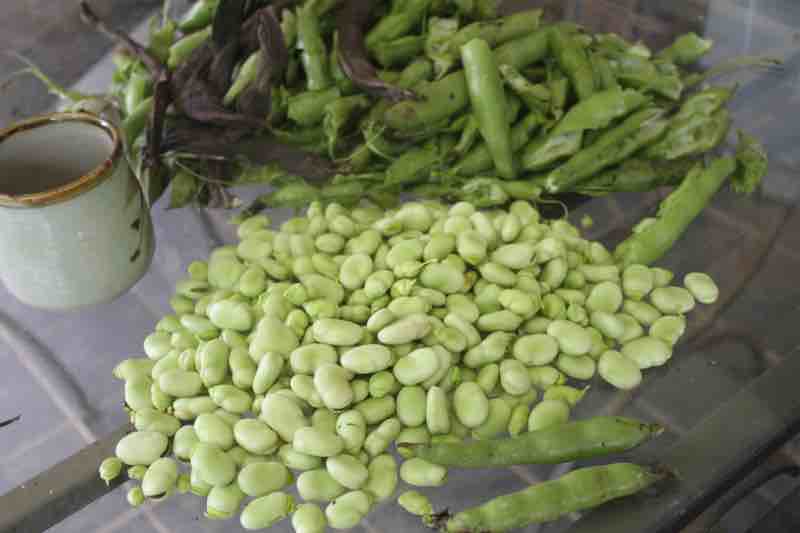
Broad beans are heavy users of water; and they grow best in cool, dry weather. They need to be irrigated. By digging first a large hole, filling it with compost and then planting the seed you are helping to retain any rain that falls. Mulching is essential.
This kind of yield is utterly dependent on easy composting methods though. We have no need of the fertilisers soaring in price thanks to Vladimir the Terrible.
In a perverse way he is actually doing us a favour by making the world more resilient to climate change; and also shooting himself in the foot. After the war is over perhaps hundreds of thousands of gardeners will have turned to natural, organic methods. Russia will have lost many of its former clients.
Composting reduces greenhouse gases
When you send your food scraps to the landfill it gets buried and smothered underground. There's no air so it decomposes anaerobically; that produces greenhouse gases like methane.
Landfills contribute literally thousands of tons of greenhouse gases to the atmosphere.
Easy composting is done with plenty of air; instead the process is aerobic. In fact it actually captures carbon-dioxide from the atmosphere.
Do your bit for king and country. It's time for easy composting.
Easy composting improves your health
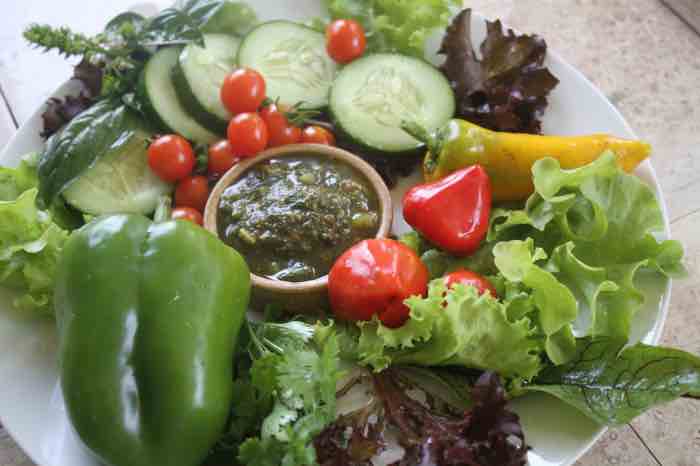 Food like this is free to the gardener
Food like this is free to the gardenerIt's beyond measure what salads like this every day of the year will do for our wellness. Freshly-picked the flavour is sublime. Homemade pesto can be rustled up in just five minutes if you have sweet basil growing in the garden.
Did you know that seven coloured foods enjoyed daily will reduce the all-cause of death by 33%; that's massive[3].
When browsing use right click and "Open Link in New Tab" or you may get a bad gateway signal.
The material expressed on this page is gleaned from the nutritional and environmental literature; it is clearly referenced. A plain distinction is made between the author's opinion and that which is scientifically proven. When in doubt consult your health professional.
To suggest a correction or clarification, write to Dr Bernard Preston here. Contact.
Newsletter
Our newsletter is entitled "create a cyan zone" at your home, preserving both yourself and Mother Earth for future generations; and the family too, of course. We promise not to spam you with daily emails promoting various products. You may get an occasional nudge to buy one of my books.
Here are the back issues.
- Lifestyle and ideal body weight
- What are ultra-processed foods?
- Investing in long-term health
- Diseases from plastic exposure
- Intensive lifestyle management for obesity has limited value
- A world largely devoid of Parkinson's Disease
- The impact of friendly bacteria in the tum on the prevention of cancer
- There's a hole in the bucket
- Everyone is talking about weight loss drugs
- Pull the sweet tooth
- If you suffer from heartburn plant a susu
- Refined maize meal and stunting
- Should agriculture and industry get priority for water and electricity?
- Nature is calling
- Mill your own flour
- Bake your own sourdough bread
- Microplastics from our water
- Alternative types of water storage
- Wear your clothes out
- Comfort foods
- Create a bee-friendly environment
- Go to bed slightly hungry
- Keep bees
- Blue zone folk are religious
- Reduce plastic waste
- Family is important
- What can go in compost?
- Grow broad beans for longevity
- Harvest and store sunshine
- Blue zone exercise
- Harvest and store your rainwater
- Create a cyan zone at your home
Did you find this page interesting? How about forwarding it to a friendly book or food junkie? Better still, a social media tick would help.
Address:
56 Groenekloof Rd,
Hilton, KZN
South Africa
Website:
https://www.bernard-preston.com